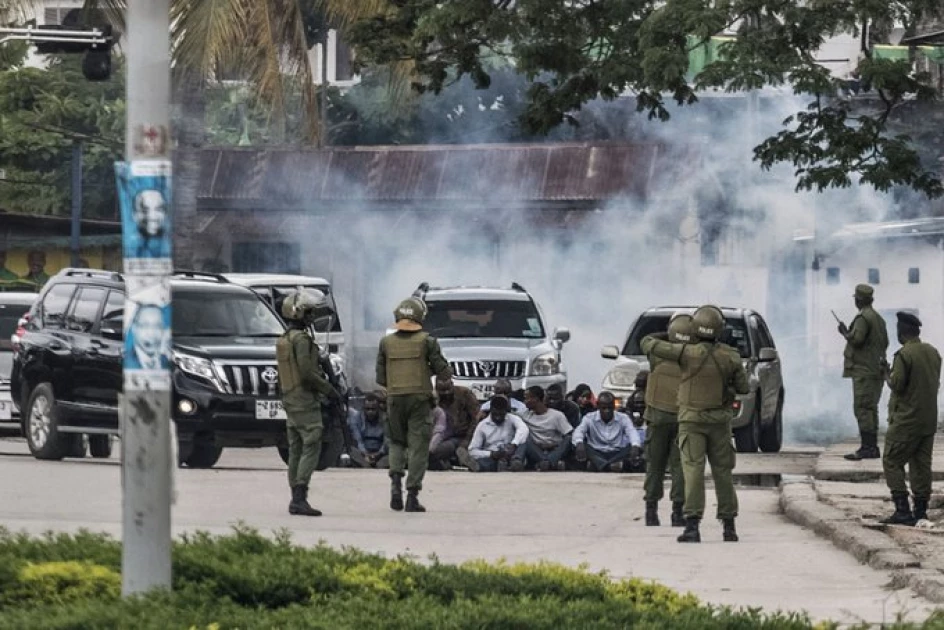Kwa Jirani: How a national polling day quickly turned into Samia Suluhu's darkest nightmare

Zanzibar's anti-riot police officers stand guard by a group of men sitting on the ground during an operation after the opposition called for protests in Stone Town, on Oct. 29, 2020. (AFP Photo)

Audio By Vocalize
As pockets of their fellow countrymen reluctantly queued to cast an already premeditated vote, thousands of others turned the polling day into a defining moment in the registration of their suppressed dissatisfaction with the president, her policies, tyrannical rule and the endemic brutalisation of the Opposition figures.
In their overwhelming numbers, Tanzanians flooded the streets, not to vote, but to agitate, fearlessly occupying highways, polling stations, business centres and markets in a remarkable display of audacious gall.
Unlike in the days gone by, Tanzanians quickly borrowed from their peers in yonder nations, their mates in Nepal and Madagascar, and decided to stage an astonishing spectacle that left even the police baffled, too stumped, too bewildered and too confounded to sufficiently react.
From Arusha to Mbeya, Kigoma to Mwanza, Tanzanians stopped traffic, razed down polling stations, invaded pro-government establishments and ripped up Samia Suluhu's billboards as they furiously marched their way into town, placards held high, violently tearing their way into the very security forces established to subdue them.
As it all unfolded, in its reminiscent gloriousness, Kenyans gleefully followed on, cheering on their Jiranis (neighbours), urging them on, rooting for them and fervently keeping the nascent revolution alive - at least by a tweet, a comment and a shamelessly gleeful cheer.
Steadfastly, the riots advanced, as more and more Tanzanians joined their brethren in a striking show of solidarity, turning what was supposed to be a customary day into President Samia Suluhu's darkest nightmare.
It was fast, scary and uncommon, and the world followed with morbid delight.
Things happened quickly - police stations were torched, car yards set ablaze, business complexes torn down, ballot boxes shredded and private homes invaded in the most daring blitz carried out in the tranquil land of rhythm and hues.
Sensing danger, the United States Embassy in Tanzania sounded an alarm: "U.S. Government personnel are advised to shelter in place at their residences. Avoid demonstrations. Avoid crowds. Keep a low profile. Monitor local media for updates. Be aware of your surroundings."
By evening, a startled Suluhu shut down the internet and imposed a mandatory dawn-to-dusk curfew in a last-minute attempt to curb the roaring madness that had engulfed her cherished fiefdom.
Tito Magoti, a Tanzanian human rights activist, told Reuters he had received reports of at least five deaths in Wednesday's protests. A diplomatic source, who asked not to be named, said there were solid reports that at least 10 people had been killed in Dar es Salaam alone.
But it was too late.
Bongoland was already crumbling under columns of smoke and debris, and the streets were too packed to evacuate.
With the internet crashed, ingenious Tanzanians quickly turned to Zello, an App which allows a smartphone to function like a walkie-talkie, and kept the coordination alive, the movement thriving, the fire blazing, and the streets studded.
"Bongo kama Nepal!" they shouted in unison, stomping their way down Dar Es Salaam, brandishing sticks and scowling at the cameras.
Instead of wasting energy queuing to vote for a candidate who was virtually vying against herself, Tanzanians turned the moment into a teachable lesson, and one that didn't come smoothly - it came with bonfires, chants, roars, rampage, and sticks and stones.
This was a people tired of political suppression, tired of a weary economy, tired of Suluhu's despotism, tired of her reign of terror; this was a people tired of being constantly tired.
Impressed by the unconventional riots, Kenyan MP Caleb Hamisi wrote on X: "This is unique, instead of protesting the results of an election, they are protesting the election itself!"
Also following the developments closely was former Makueni Governor Kivutha Kibwana, who wrote: "The spirit of Nyerere has entered into Tanzanian GenZ and Tundu Lissu. They are demanding their country back. All of East Africa & indeed Africa say NO REFORMS, NO SHAM ELECTIONS. Tanzania deserves an interim government to organize for a new constitution and genuine elections."
Exiled Tanzanian activist Maria Tsarungi Tsehai also shared an interesting insight into Tanzania's darkest day. She wrote: "Yesterday was a historic day in #Tanzania because the people overcame fear and took to the streets to protest what @SuluhuSamia and her cronies had violently and illegally named an “Election”. Coincidentally, October 29 has historic significance - It is the day the united country of Tanganyika and Zanzibar was renamed Tanzania and the new flag unveiled. It also the birthday of the late John Magufuli. Interesting huh?"
Despite what happens next, at least, Tanzanians may now go to bed satisfied with their actions, proud of their courage, confident of their future and hopeful for a brighter day.
Their tormentor may not have fled the town in a private jet yet, but if the October 29 upheavals are anything to go by, Tanzania has woken up and we all know what happens when you don't let sleeping dogs lie.


Leave a Comment